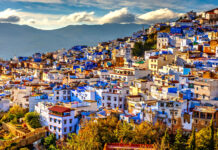Moroccans are, in general, exceedingly accepting and welcoming. They are generally laid-back, even though the majority of the population is religious. However, you must avoid offending people’s religious beliefs, particularly those who are conservative and elderly. During Ramadan, avoid wearing tight clothing, cuddling and kissing in public, and eating, drinking, and smoking in public. For everything, you need to know about Moroccan culture and etiquette before your visit, check out this guide from Story Rabat, the best hotel in Rabat, Morocco.
Etiquette and customs in Morocco
What to Wear in Morocco
Before going out to explore the activities you must do in Morocco, Moroccan culture and etiquette place a strong emphasis on clothing. Clothing that does not entirely cover areas of the body considered “private,” such as both legs and shoulders, may upset many Moroccans, particularly in rural areas. In cities, Moroccan ladies wear short-sleeved shirts and knee-length skirts, and most young Moroccan women do not wear veils (though they may wear a headscarf). They may, however, encounter more harassment as a consequence. Men can wear sleeveless T-shirts and shorts that are above the knee.
Dress conservatively.
Before leaving your hotels in Morocco, women must be covered from wrist to ankle, and men must be covered from over the shoulder to below the knee, according to the Muslim concept of “modest attire.” Following Moroccan clothing etiquette, at least in rural areas, is a good idea. Women should avoid wearing above-the-knee shorts or skirts, and people of whatever gender must avoid wearing sleeveless T-shirts or really short pants. Ordinary T-shirts, especially in rural mountain settings, may be considered undergarments. Thus, before you step out of the best accommodations in Morocco, it is best to observe what the Moroccans wear and dress accordingly when you are deciding what to wear.
Visiting Moroccan mosques
If you are not a Muslim, one of the major frustrations of visiting Morocco is not being allowed into its mosques. The partially rebuilt Almohad construction of Tin Mal in the High Atlas, the equally disused Great Mosque at Smara in Western Sahara, the patio of Moulay Ismail’s sanctuary-mosque in Meknes, and the Hassan II Mosque in Casablanca, one of Morocco’s most beautiful cities are the only exceptions. Non-Muslims will have to make do with peeking through open doors elsewhere, and even then, you should be careful: even though worshippers don’t seem to mind tourists peering into the Kairaouine Mosque in Fez (the country’s most important religious structure), you must never approach a shrine too closely.
Morocco’s tipping practices
In Morocco, it is customary to tip waiters in cafés (1dh per person) and at the best restaurants and bars in Rabat (5dhs or more in moderate establishments, 10–15 percent in upmarket establishments); museum and monument curators (3–5dhs); gardiens de voitures (5 dhs); filling station attendants (3–5dh); and porters who help you transfer your luggage onto buses (5dhs). Tipping taxi drivers is not expected but always appreciated.
Morocco’s dining etiquette
You may observe that the etiquette is to use your hands rather than a spoon and fork when you eat in a local café or are invited to a home in Morocco. You must eat with your right hand exclusively (the left is for going to the bathroom)as Muslims do. You should hold the bread between your fingers and use a thumb as a scoop, and it is often easier to remove the mushy center and only utilize the crust.
If you’re eating from a communal plate at a friend’s house, Moroccan table etiquette dictates that unless the host directly offers you a piece of meat, you only take what’s right in front of you. Please visit our food and drink page for additional information about Moroccan cuisine.
Moroccan etiquette at home
It is customary to remove your shoes before entering the reception area and to follow your host’s example when visiting a home. Bringing a present is customary in Morocco; delicious pastries or tea and sugar are always welcome, and you may even bring meat to a needy household.
Also Read, 5 Fantastic Attractions to Visit in Rabat Morocco
Moroccan women on vacation
Traveling in Morocco is unquestionably different from traveling in a Western country, particularly for women. This is due in part to the distinct roles of the sexes being defined more clearly in Morocco than they are in the west, and to stricter sexual mores. Many women still wear the veil in small towns and villages, and even in the Medinas of large cities, and the street is essentially a man’s territory. The general presumption in Morocco is that only prostitutes smoke cigarettes or drink in bars, and most Moroccan men expect to marry a virgin. However, such views are increasingly fading among urban millennials, and some Moroccan women may now be found drinking in more sophisticated pubs, and even more frequently in cafés, which were once an all-male preserve.
In Morocco, how should you handle sexual harassment?
The simplest ways for avoiding unwanted attention are the exact methods you’d employ at home. One will avoid a lot of adversities if one looks confident and assured. All but the most stubborn males will be deterred if you make it apparent that you have the same standards as your Moroccan counterparts. Although they may have to endure catcalls and nasty comments regularly, Moroccan women would not condone being assaulted in the public, for example.
- Appearing serious while remaining courteous. Because Moroccan women are traditionally timid and aloof, spontaneous friendliness, particularly any type of physical interaction between sexes, may be misinterpreted, being nice but formal when speaking to guys will reduce the risk of misunderstanding. The disadvantage of this strategy is that it makes it more difficult to get to know the people, however, once you’ve been in the nation for quite some time, you’ll likely have a sense of the types of men with whom this strategy is important. It is also advisable to avoid smoking in public because some men still see smoking as a sign of sexual interest.
- Be conservative in your attire. Another factor that can help you avoid harassment is how you dress. Wearing “modest” clothing (length sleeves, long skirts, baggy rather than tight clothing) will give you a respectable appearance. It gives this impression even more if you wear a headscarf to cover your ears and hair.
- You can say you’re traveling with a male companion. Avoiding eye contact, mentioning a nearby spouse staying in a honeymoon hotel in Rabat, and creating the appearance that you are traveling with a partner or merely a male friend are all good ways to avoid complications.
- Physical contact must be avoided. Similarly, avoid physical contact with Moroccan men, even in a way that wouldn’t be construed as sexual at home, since it could easily be misunderstood. On the other hand, if a Moroccan man grabs you, he has clearly crossed the line, and you must not be scared to make a spectacle. Yelling “Shooma!” (“Shame on you!”) will almost certainly result in onlookers stepping in to help you, as well as a very embarrassing scenario for your offender.
These are the important etiquettes and cultures you have to keep in mind before traveling to Morocco to explore, have a great time, and indulge in the best luxury hotels in Marrakech, Morocco. Visit our site and read the rest of our blogs for the best areas and hotels to stay in Rabat and for more tips and recommendations for a pleasant holiday in Morocco.



















